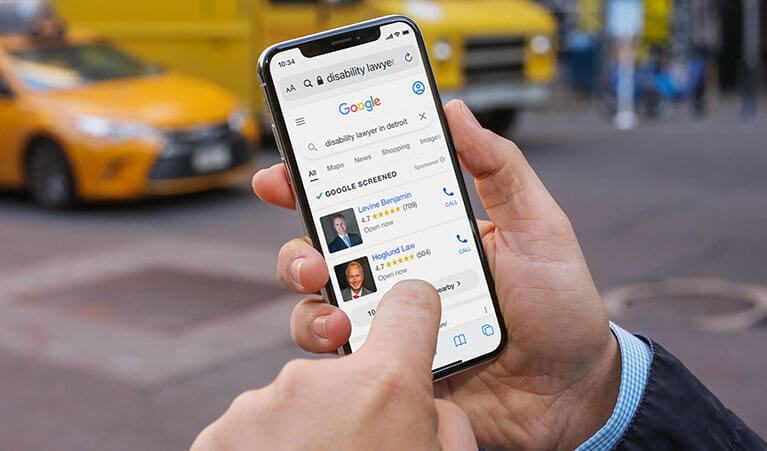Law Firm Marketing Tips Utilizing Google AdWords and Google Analytics
As a premier law firm marketing agency, we LOVE keeping up with all things new related to tech and ways we can help lawyers land quality leads. This morning, Search Engine Land, a global SEO and SEM leader, published an article related to updates within Google Analytics pertaining to conversions. Our SEO content writers JUMPED at the opportunity to talk about SEL’s findings, as one of our BIG niches is that we FOCUS not just on leads, but CONVERSIONS. And, going further, at Legal Leads Group we consider a TRUE conversion as to when a lead converts to a case that pays out for the law firm.
So, with that said, today we are going to do a deep dive into the new conversion vs key events updates mentioned in the SEL blog. We will also provide extensive data on law firm marketing tips utilizing Google AdWords and Google Analytics. As always, when it comes to law firm marketing, leveraging Google AdWords (now known as Google Ads) and Google Analytics can be a game-changer in how firms attract and convert leads into clients. Below are actionable tips and insights on how law firms can effectively use these tools to enhance their marketing efforts.
Google AdWords for Law Firms
1. Understand Your Audience:
Before launching any Google AdWords campaign, it’s crucial to understand who you’re targeting. For law firms, this could be individuals seeking legal advice, representation for a personal injury claim, or assistance with family law matters. Use Google Ads’ targeting options to reach potential clients based on demographics, location, and even the type of device they’re using.
2. Keyword Research:
Conduct thorough keyword research to identify terms that potential clients are using to find legal services. Tools like Google Keyword Planner can help you find relevant keywords and provide insights into search volume and competition.
3. Craft Compelling Ad Copy:
Your ad copy should speak directly to the needs of your potential clients. Highlight your firm’s unique selling points (USPs) and include a clear call-to-action (CTA). For law firms, CTAs like “Schedule a Free Consultation” can be particularly effective.
4. Use Ad Extensions:
Ad extensions expand your advertisement, making it more visible and providing additional information. For law firms, location extensions, call extensions, and sitelink extensions can improve the performance of your ads by making it easier for potential clients to reach out.
5. Landing Page Optimization:
Ensure that the landing page associated with your ad is relevant, informative, and easy to navigate. It should also be optimized for conversions, encouraging visitors to take action, such as filling out a contact form or calling the firm.

Google Analytics for Law Firms
1. Set Up Conversion Tracking:
Use Google Analytics to track conversions from your Google Ads campaigns. This will allow you to see which ads and keywords are driving leads and at what cost.
2. Understand User Behavior:
Analyze user behavior on your website to understand what content resonates with your audience. Look at metrics like bounce rate and average session duration to gauge engagement.
3. Audience Insights:
Google Analytics provides valuable insights into your audience’s demographics, interests, and more. Use this data to refine your marketing strategies and tailor your messaging.
4. Evaluate Campaign Performance:
Regularly review your Google Analytics data to evaluate the performance of your campaigns. Look for trends in traffic sources, user behavior, and conversion rates to identify what’s working and what isn’t.
5. Make Data-Driven Decisions:
Use the insights gained from Google Analytics to make informed decisions about your marketing strategies. Adjust your Google Ads campaigns based on data to optimize for better results.
Our Approach to Law Firm Marketing
As a premier law firm marketing agency, Legal Leads Group understands the intricacies of digital marketing for the legal industry. By utilizing a combination of Organic SEO, Google Ads, Google Screened Ads, and Social Media marketing, Legal Leads Group tailors strategies specifically designed to generate high-quality case leads each month for law firms.
1. Comprehensive SEO Strategies: Legal Leads Group employs advanced SEO tactics to ensure that law firm websites rank highly for relevant keywords, driving organic traffic that is more likely to convert into leads.
2. Targeted Google Ads Campaigns: By creating targeted Google Ads campaigns, Legal Leads Group helps law firms reach potential clients at the exact moment they’re searching for legal services online.
3. Google Screened Ads: For certain practice areas like family law or estate planning, Google Screened Ads provide an additional layer of trust by showing that a lawyer has been vetted by Google.
4. Social Media Integration: Legal Leads Group also leverages social media platforms to engage with potential clients and build brand awareness for law firms.
Conversions: From Clicks to Clients
Legal Leads Group doesn’t stop at generating clicks; they focus on the entire funnel from site conversion to call conversion, intake, retained case, and completed case. This end-to-end approach ensures that law firms don’t just receive leads but actual paying clients.
In 2024, Legal Leads Group is set to enhance its offerings further with the launch of its own Case Management Software integrated with sophisticated front-end CRM and chat software equipped with full case qualify and intake capabilities. This integration will streamline the process from initial lead capture to case resolution, ensuring efficiency and client satisfaction. By harnessing the power of Google AdWords and Google Analytics, law firms can not only obtain valuable leads but also gain deep insights into the effectiveness of their campaigns. With the expertise of agencies like Legal Leads Group, law firms can optimize their digital marketing efforts to achieve better ROI and ultimately grow their client base.

Harnessing All of Google’s Tools to Powerup Your Law Firm Marketing Campaigns
So, the article published by Search Engine Land provided the advertising world with a plethora of knowledge related to conversion updates between Google Analytics and Google AdWords. One KEY sticking point that comes up in every conversation with a new potential law firm client, is conversions. However, most marketing companies and attorneys have a very different opinion on what a conversion truly is. When it comes to law firm marketing, and investing money and time into an ad campaign, attorneys will tell you POINT blank that a conversion means a paying client and or case. Period. Unfortunately, if you ask the a law firm marketing company what the definition of a conversion is, you’re going to get a laundry list of potential answers.
Impressions (your ad showing up), first page rankings, a click, an call, a form fill, blah blah blah. Law firm advertising agencies are notorious for trying to spin so much (you know what) JUST to make it seem as if they are providing their clients with value. The bottom line, the ONLY conversion that matters by and between a law firm marketing company and their attorney client is when a potential client FINDS the law firm from one of the ads and or organic listings, or additional marketing campaigns, contacts the law firm, retains the firm, and the client converts to a paying case.
At Legal Leads Group, we’re all about increasing your ROI. We understand that in order for our business relationship to flourish, we MUST be able to provide our clients with viable converting cases. So, let’s dive even deeper into harnessing all of Google’s tools to powerup your law firm marketing campaigns.
Understanding GA4 and Its Impact on Law Firm Marketing
Google Analytics 4 (GA4) represents a significant shift from previous versions of Google Analytics, offering a new set of features and a different approach to data collection and analysis that can be particularly beneficial for law firms. Here are some GA4 features that are relevant to law firms and how they can be leverage.
Event Tracking in GA4
- Enhanced Measurement: GA4 automatically tracks a range of interactions as events without the need for additional code. For law firms, this means that key actions such as page views, scrolls, outbound clicks, site searches, video engagement, and file downloads can be monitored closely.
- Custom Events: Law firms can set up custom events to track specific interactions that are unique to their services, like form submissions for free consultations or downloads of legal guides.
- Event Parameters: With GA4, each event can have additional parameters, providing deeper insights. For instance, a ‘contact form submit’ event can include parameters like the type of legal service inquired about.
Conversion Measurement
- Flexible Conversions: In GA4, any event can be marked as a conversion. This flexibility allows law firms to tailor conversion tracking to their specific goals, whether it’s tracking phone calls, contact form submissions, or live chat engagements.
- Enhanced Conversion Tracking: By integrating with Google Ads, GA4 allows law firms to see how their advertising efforts directly lead to conversions, providing a clear picture of their return on investment (ROI).
User Engagement and Retention
- Engagement Metrics: GA4 introduces new engagement metrics such as engaged sessions, engagement rate, and engagement time. These metrics help law firms understand not just when users visit their site, but how they interact with the content.
- User-centric Analysis: Unlike previous analytics versions that focused on sessions, GA4 is more user-centric. This helps law firms identify the client journey more accurately and understand how users interact with their site over time.
Cross-platform Tracking
- Unified App and Web Data: For law firms that have both a website and a mobile app, GA4 can track user interactions across these platforms in a unified way. This provides a holistic view of how clients engage with the firm’s digital presence.
Predictive Metrics
- Predictive Analysis: GA4 uses machine learning to predict future user behavior. For example, it can estimate the potential revenue from a segment of users. Law firms can leverage these insights to identify high-value prospects and tailor their marketing efforts accordingly.
Privacy and Data Control
- Privacy Controls: With increasing concerns over user privacy, GA4 provides more robust privacy controls. This is crucial for law firms that handle sensitive client information.
- Data Deletion: Law firms can delete data in GA4 if needed, which is important for compliance with regulations such as GDPR or CCPA.
By utilizing these features effectively, law firms can gain valuable insights into their website’s performance and user behavior. This data-driven approach enables law firms to optimize their online presence, improve client acquisition strategies, and ultimately enhance their marketing ROI.

AdWords and Screened Ads for Law Firms
Google Ads (formerly Google AdWords) and Google Screened Ads are powerful tools that law firms can use to increase their online visibility and attract more clients. Here’s how these platforms can be beneficial for legal practices:
Traditional Google AdWords for Lawyers
1. Targeted Advertising: Google Ads allows law firms to display their ads to users who are actively searching for legal services. This targeting is achieved through the use of keywords, which can be specifically chosen to match the legal specialties of the firm, such as “personal injury lawyer” or “divorce attorney.”
2. Local Search Ads: Law firms often serve clients in specific geographic areas. Local search ads can help firms appear prominently in search results when potential clients in their region search for legal services.
3. Pay-Per-Click (PPC) Model: With Google Ads, law firms pay only when someone clicks on their ad. This PPC model ensures that the firm’s marketing budget is spent on actual leads rather than just views.
4. Budget Control: Google Ads provides law firms with the ability to control their advertising budget. Firms can set daily budgets and adjust bids for different keywords based on performance and competition.
5. Ad Extensions: Using ad extensions, law firms can enhance their ads with additional information like phone numbers, addresses, links to specific pages on their website, or even client testimonials. This additional information can improve click-through rates and provide potential clients with more ways to contact the firm.
Google Screened Ads for Attorneys
1. Trust and Credibility: Google Screened is a feature available to professional service providers, including law firms. It involves a thorough background check and license verification process. Firms that pass these checks are given a “Google Screened” badge, which helps build trust with potential clients.
2. Local Service Ads (LSAs): Google Screened is part of Google’s Local Services Ads platform. LSAs are designed to connect local businesses with people who search on Google for the services they offer. For law firms, this means appearing at the very top of search results when potential clients search for legal services in their area.
3. Pay-Per-Lead: Unlike traditional Google Ads, with LSAs, law firms pay per lead rather than per click. This means they pay only when a potential client contacts them through the ad, making it a cost-effective option for many firms.
4. Easy Dispute Process: If a law firm receives an invalid lead—such as a solicitation or a wrong number—they can dispute the charge through Google’s platform.
5. Ranking Factors: The ranking of LSAs depends on various factors including review score, responsiveness to client inquiries, and proximity to potential clients’ locations.
Both Google Ads and Google Screened Ads can be powerful components of a law firm’s digital marketing strategy. Google Ads offers highly targeted advertising capabilities with flexible budgeting, while Google Screened Ads add an extra layer of trust for local legal services, aligning closely with the intent of potential clients and providing a pay-per-lead pricing model. By leveraging these tools effectively, law firms can increase their online presence, attract more qualified leads, and ultimately grow their practice.
Legal Leads Group’s Law Firm Marketing Strategies – Getting You Quality Case Leads
Legal Leads Group is a specialized marketing agency focused on generating high-quality leads for law firms. While I don’t have specific insights into the proprietary strategies of any particular agency, including Legal Leads Group, as of my last update, I can outline some common marketing strategies that a specialized group like this might employ to help law firms attract and convert potential clients. Here’s an overview of such strategies.
Search Engine Optimization for Attorneys
- Content Marketing: Creating informative content that addresses common legal questions and issues can help a law firm rank higher in search engine results, drawing organic traffic to their website.
- On-Page Optimization: Ensuring that each page on a law firm’s website is optimized for search engines with the right keywords, meta descriptions, and HTML tags.
- Local SEO: Optimizing a law firm’s online presence to appear in local search results, which is critical for attracting clients in specific geographic areas.
Pay-Per-Click (PPC) Advertising for Lawyers
- Google Ads Campaigns: Managing targeted PPC campaigns on Google Ads to capture the attention of people searching for legal services.
- Landing Page Optimization: Creating and testing optimized landing pages that are linked to PPC ads to maximize conversion rates.
Social Media Marketing for Law Firms
- Platform Selection: Identifying the social media platforms where potential clients are most active and tailoring content to those platforms.
- Engagement Strategies: Developing interactive content and campaigns to engage users and build brand awareness.
Reputation Management and Boosting Your Law Firm’s Review
- Client Reviews: Encouraging satisfied clients to leave positive reviews online, which can improve a law firm’s credibility and attract new clients.
- Online Presence: Monitoring and managing the law firm’s online reputation across various platforms, including social media and legal directories.
Law Firm Email Marketing
- Newsletter Campaigns: Sending regular newsletters to subscribers with updates on the law firm, legal tips, and other relevant content.
- Lead Nurturing: Implementing email sequences that nurture leads over time, moving them closer to becoming clients.
Analytics and Conversion Rate Optimization (CRO)
- Data Analysis: Using tools like Google Analytics to track website traffic, user behavior, and conversion paths.
- A/B Testing: Running A/B tests on various elements of the website and marketing materials to improve conversion rates.
Video Marketing for Attorneys
- Educational Videos: Producing educational video content that can help establish the law firm’s attorneys as thought leaders in their practice areas.
- Testimonial Videos: Sharing client testimonial videos to provide social proof and build trust with potential clients.
Networking and Partnerships – How Law Firms Can Grow Their Local Presence
- Referral Programs: Setting up referral programs with other professionals who can refer clients to the law firm.
- Community Involvement: Participating in community events and organizations to increase local visibility and network with potential clients.
These strategies are often used in combination to create a comprehensive marketing approach that covers multiple channels and touchpoints. A successful marketing campaign for a law firm would typically be customized based on the specific goals, target audience, and practice areas of the firm.
Google Analytics and AdWords – A One Two Punch for Law Firms
Now, let’s discuss the specialization of legal leads in consumer-facing law firm campaigns:
Law firm marketing lead generation companies that specialize in consumer-facing law firm campaigns are adept at connecting individuals seeking legal assistance with law firms that provide consumer legal services. These services can range from personal injury and family law to estate planning and bankruptcy. The specialization in consumer-facing campaigns involves a few key strategies:
Understanding Consumer Behavior
- Market Research: Legal lead generation companies conduct thorough market research to understand the needs and behaviors of consumers seeking legal services.
- Consumer Pain Points: They identify common issues or ‘pain points’ that drive individuals to seek legal help, which informs the messaging and targeting of campaigns.
Targeted Advertising
- Demographic Targeting: Campaigns are tailored to the demographics most likely to need consumer legal services, such as age, income level, or specific life events.
- Search Intent: Using search engine marketing, they target keywords that individuals are likely to use when searching for legal help, ensuring that ads appear to those with immediate legal needs.
Content Marketing and SEO
- Educational Content: Providing valuable content that addresses common questions or concerns related to consumer law topics can attract individuals seeking guidance.
- Search Engine Optimization (SEO): Optimizing web content for search engines helps law firms rank higher in search results, increasing visibility to potential clients.
Conversion-Focused Websites and Landing Pages
- User Experience (UX): Websites and landing pages are designed with a focus on user experience, making it easy for potential clients to find information and take action.
- Call-to-Action (CTA): Strong calls-to-action are used to encourage website visitors to contact the law firm, whether through a phone call, contact form, or online chat.
Social Media Engagement
- Community Building: Creating and engaging with communities on social media platforms where potential clients might seek advice or recommendations for legal services.
- Social Proof: Sharing testimonials and success stories to build trust with prospective clients.
Reputation Management
- Client Reviews: Encouraging satisfied clients to leave positive reviews online, which can serve as powerful endorsements for the law firm.
- Online Presence Management: Monitoring and responding to online reviews and comments, maintaining a positive reputation.
Performance Tracking and Analytics
- Lead Tracking: Implementing systems to track where leads are coming from, which allows for better allocation of marketing resources.
- ROI Analysis: Using analytics tools to measure the return on investment of different marketing strategies and adjusting tactics accordingly.
By focusing on these areas, legal lead generation companies can create effective consumer-facing campaigns that help law firms connect with potential clients who are actively seeking legal assistance.
Focusing on Conversion to Payment – Law Firm Marketing Campaigns that Focus on True Value
Innovations for the Future of Law Firm Marketing
Choosing the best law firm marketing company for your practice involves careful consideration of several factors to ensure that the partnership will meet your specific needs and help you achieve your goals. Here’s a guide to help you find the right marketing company for your law firm:
Define Your Goals and Needs
- Identify Objectives: Clearly define what you want to achieve with your marketing efforts, whether it’s increasing brand awareness, generating leads, or improving your online presence.
- Budget: Determine how much you are willing to invest in your marketing efforts and look for companies that can work within your budget.
Research Potential Companies
- Specialization: Look for companies that specialize in law firm marketing as they will understand the nuances of legal advertising regulations and the competitive landscape.
- Reputation: Check reviews, testimonials, and case studies to gauge the effectiveness and reliability of the companies you’re considering.
- Experience: Consider the length of time the company has been in business and their experience with firms similar to yours in size and practice areas.
Evaluate Their Offerings
- Services: Ensure the company offers comprehensive services that align with your goals, such as SEO, PPC, content marketing, social media management, and reputation management.
- Customization: The company should be willing to tailor their services to fit your specific needs rather than offering a one-size-fits-all approach.
- Technology: Assess the technology and tools the company uses for campaign management and analytics. The more advanced their resources, the more refined their campaign execution and tracking will be.
Assess Their Understanding of Your Practice
- Industry Knowledge: The marketing company should have a good understanding of the legal industry and be up-to-date with its trends and challenges.
- Client Knowledge: They should take the time to understand your practice areas, target clientele, and what sets you apart from competitors.
Review Their Track Record
- Success Metrics: Ask for performance metrics from past campaigns to see how they measure success and whether their results align with what you’re looking for.
- Client Retention: High client retention rates can indicate that the company delivers consistent value and satisfaction.
Consider Communication and Reporting
- Communication: The right company should communicate clearly and regularly, providing updates on campaign progress and being responsive to your inquiries.
- Reporting: They should offer transparent reporting that makes it easy for you to understand the return on your investment.
Check Compatibility
- Cultural Fit: Ensure that their company culture aligns with yours. A good cultural fit can lead to a more productive and enjoyable working relationship.
- Vision Alignment: The marketing company should share your vision for growth and success, and be committed to helping you achieve it.
Schedule a Consultation
- Initial Meeting: Arrange a meeting or a call with the marketing companies on your shortlist to discuss your needs and ask any remaining questions.
- Proposal Request: Ask for a proposal that outlines their strategy, expected outcomes, timelines, and costs.
Make an Informed Decision
- Take your time to compare proposals, check references, and ensure that you feel confident in the company’s ability to deliver results before making a decision.
Remember, the best marketing company for your law firm is one that not only has expertise in legal marketing but also understands your unique practice and shares your commitment to growth.
Call Legal Leads Group Today – Perhaps the Best Law Firm Marketing Agency You Will Ever Work With
What are you waiting for, call Legal Leads Group today. We just might be the best law firm marketing agency for you and your practice. Let one of our ad specialist and lead generation team members provide you with a free, analytical and thorough presentation in which we will identify what we can do to land your law firm the case leads you’ve been searching for. We promise, unlike other law firm marketing companies, our lead gen reps will NOT pressure you to sign up. In fact, that’s not how we work. Our initial meeting is a very detailed info gathering event. This lets us go back to the drawing board to figure out if and how we can help you grow your practice. Let us show you today the Legal Leads Difference.

